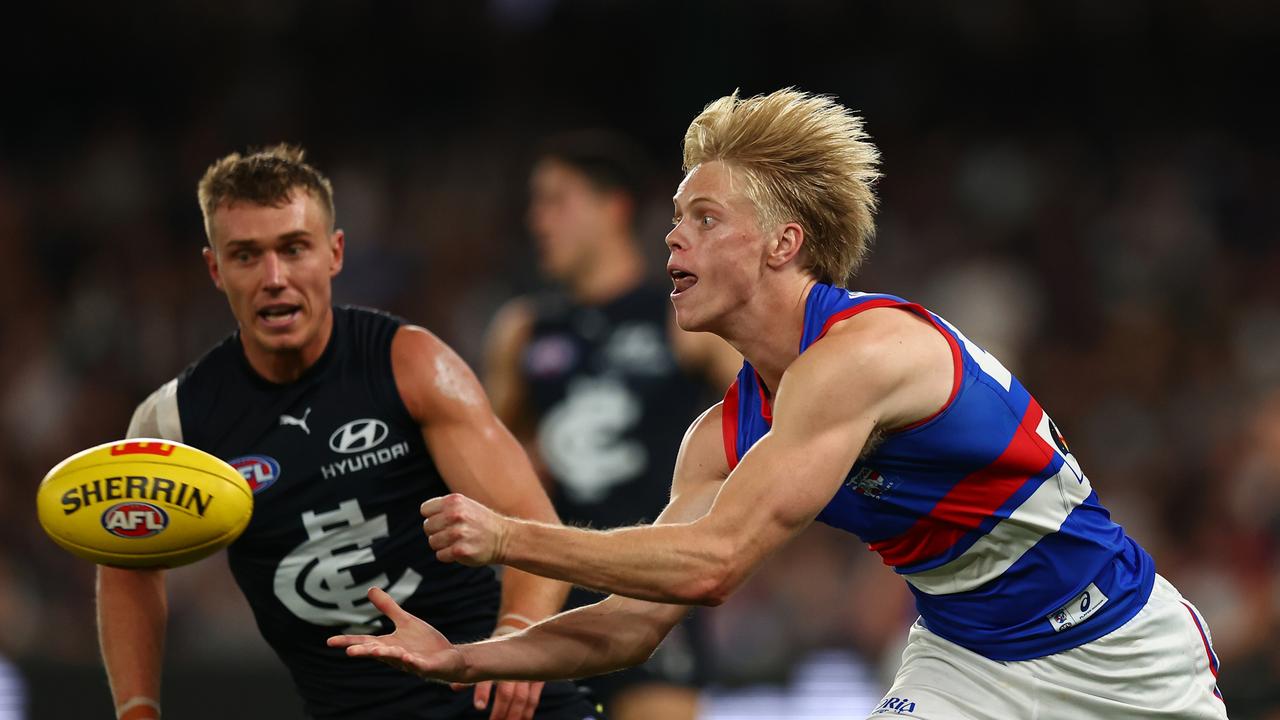Mark Robinson: Inside 24 years of coach sackings in the wake of the departure of West Coast premiership coach Adam Simpson
Adam Simpson became the latest in a long line of AFL coaches to be sacked. MARK ROBINSON takes you inside the ruthless boardroom calls, the stress on coaches under the blowtorch and what it’s like when the axe finally falls.
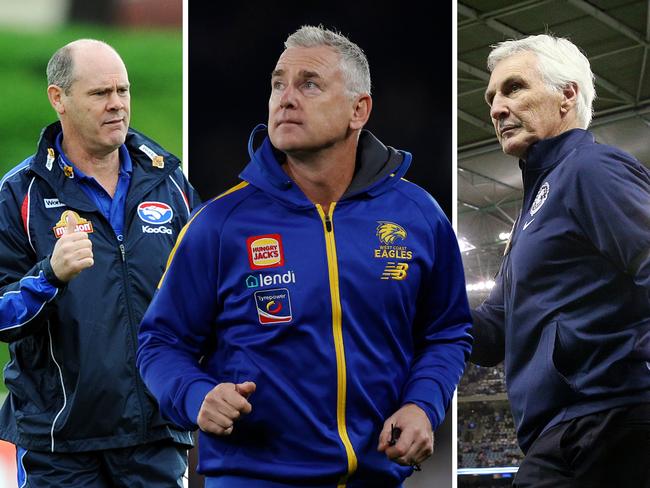
AFL
Don't miss out on the headlines from AFL. Followed categories will be added to My News.
Since the start of the 2000 season, there’s been 66 full-time coaches of AFL clubs.
Of them, just 14 are premiership coaches.
Five of them – Leigh Matthews, Mark Thompson, Alastair Clarkson, Damien Hardwick and Chris Scott – are multiple premiership-winning coaches. They share 14 between them.
And of the 14 premiership coaches, only four were not AFL premiership players. They were Mark Williams, Paul Roos, Clarkson and Luke Beveridge.
Adam Simpson is both a premiership player and coach, putting him in esteemed company.
He was sacked this week by West Coast, in what is considered a time of crisis because the Eagles have won eight games and lost 53 in the past two and a half years.
Ken Judge was sacked in 2002 and Simpson was sacked 22 years later. In between, there was John Worsfold (2002-13), which tells us that historically the Eagles are a stable and ‘stick fat’ footy club.
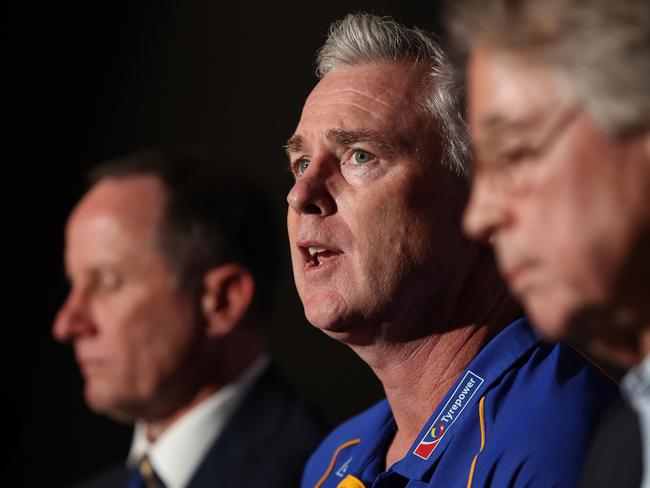
Crisis? St Kilda has sacked six coaches since the turn of the century – Tim Watson, Malcolm Blight, Grant Thomas, Scott Watters, Alan Richardson and Brett Ratten. And Ross Lyon walked the first time around.
So, which club would you consider a crisis club? The stable Eagles or the turnstile-clicking Saints?
Trevor Nisbett was Simpson’s chief executive for all of his 11-year career bar this year, and all up was chief executive of the Eagles for 25 years.
“I think the club should be very proud with how it looked after the coaches over a period of time,” he said.
Describing the departures of their three coaches, he said it was difficult with Judge.
“We didn’t gel at all, Ken and the footy club,” he said.
“Woosha (Worsfold) came to us. He was a bit like Simmo, he was worn out. He was thinking he would like to go again, but then he changed his mind. And then Woosha came in one day and said: ‘I’m done’. I saw it in his face, he had come to the realisation he was done.
“I also understand Simmo’s position because he just needs a break.”
The Godfather of WA footy, Nisbett said the decision to contract Simpson to coach in 2024 was correct, and said the decision to end his tenure was also correct.
“I think it’s the right conclusion,” he said. “After all he’s been through, and the continuing hammering he’s been receiving, it’s the right conclusion.”
The now infamous West Australian front page angered him. “They’re like school kids, and it’s run by kids,” he said. “It was awful.”
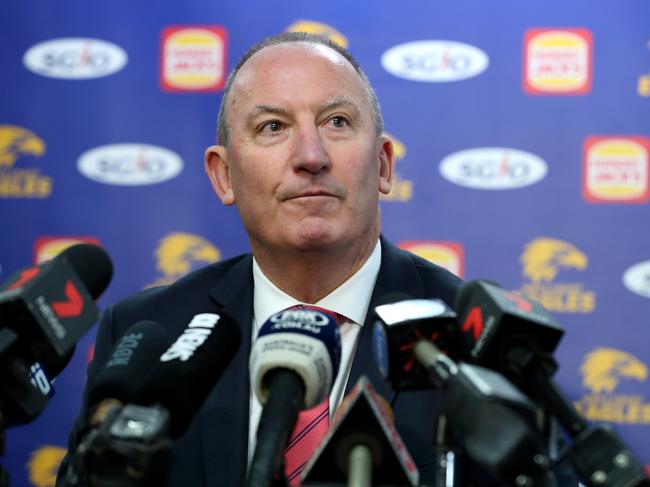
But the local media’s unrepentant coverage was a separate backdrop to the club’s own awkwardness which surrounded the Simpson announcement. It included a brief press release and no thankyou to Simpson and the blundered repartee between Simpson and chief executive Don Pyke and about whether he would coach a final game or not.
“It was an awkward week because the club just about always has waited until the end of the season to formulate plans for coaches,” Nisbett said.
“He’s been through the mill and consequently the decision was made and I do believe it was mutual.
“But it is awkward when you’re not used to doing that as a footy club. I was never keen to dismiss anyone mid-season, but we’ve always had good coaches.”
The decision to extend Simpson’s contract at the end of 2023, despite widespread speculation that he would be sacked, was done, Nisbett said, to stagger the departures of key figures, including Nisbett’s.
“A lot of clubs would wipe the floor with everyone, but there’s really no need,” Nisbett said. “The only thing you react to is public pressure or media pressure, and if you reacted to that you’d be doing something different every day.
“It’s important the administration keep their heads together and make sure they keep stability, otherwise everything fractures and it takes you 20 years to get out of it.
“I think Simmo deserved the opportunity with a fit squad.
“There were a few new people, so it was the right move to give Adam the opportunity.”
THE ANATOMY OF A COACH SACKING
Coach sackings are said to be a blood sport in the helter skelter word of footy, but mostly always it’s results which dictates the removal of coaches and not the pointed opinions of a ravenous media.
Some sackings since 2000 seemed elementary. Tim Watson at St Kilda, Mark Neeld at Melbourne, Matthew Primus at Port Adelaide and David Noble at North Melbourne, for example, couldn’t get the job done.
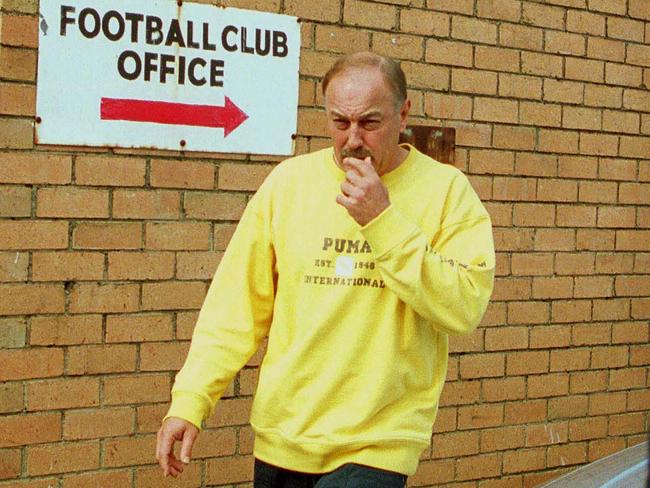
There were some bitter sackings – Malcolm Blight at St Kilda (2001) and Mick Malthouse at Carlton (2015) come to mind – and several shock departures which included Brendan McCartney at the Bulldogs (2014), Grant Thomas at St Kilda (2006) and Brett Ratten at St Kilda (2022).
There were complicated sackings – Malthouse (2011) and Alastair Clarkson (2021) – and deadset ugly sackings, headlined by the ridiculous situation with Ben Rutten at Essendon (2022).
And there were agonising decisions made on club legends. Kevin Sheedy departed Essendon (2007) after 27 seasons and 634 games, Mark Williams was sacked by Port Adelaide (2010) after delivering the club its first AFL flag in 2004, and Nathan Buckley was shown the door at Collingwood (2021).
As Carlton president, Mark LoGiudice – and his board – sacked Malthouse (May 2015) and Brendon Bolton (June 2019) and he stressed that there was no badge of honour in doing so.
“It’s very, very difficult,” he said. “It’s not an easy decision at any point in time when you have to part ways with a coach or anyone else for that matter.
“It’s not easy because you’re thinking not only about them as a person, you’re thinking about their families and the effect that might have.
“But ultimately you have to make the right decision in what’s in the best interests of the organisation you’re working for. And it doesn’t matter whether it’s a footy club or in business, there’s nothing nice about parting ways with people.”
The relationship between Malthouse and the club had completely broken down at the end, while Bolton suffered through the years of a complete rebuild.
The decisions – and probably relatable to all coach sackings – were not snap judgments.
“If you just got up one morning and said, ‘bang, we’re parting ways’ then you’ve got a problem,” LoGiudice said. “Things evolve over a period of time because you’re continually assessing. That’s the board’s role, to assess what’s going on.
“Mutually parted was is the ideal scenario, and I would say a lot of times, coaches know, boards know, administration know that there’s change in the air and it comes.”
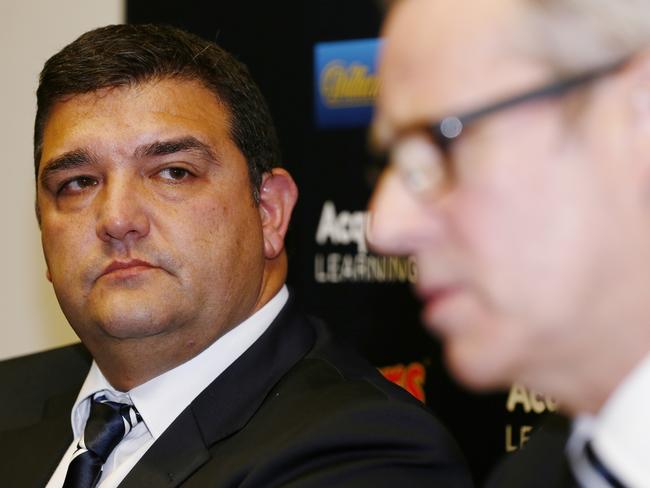
Asked with hindsight if he would handle both departures differently, LoGiudice said: “It’s a good question. I don’t have any regrets because you can only make the best decision at that particular point in time and that’s what we thought was right at the time.”
He felt for the first-timer Bolton. “You see the players we have today, they were somewhere between five and 10 years younger than what they are today,” he said. “So, we are where we are today because Brendon put a lot of work into a lot of younger people who believed in the club and who are reaping the rewards today.
“Vossy has done an outstanding job, but Brendon did a lot with those players when they were younger and he was part of the foundation of what we are today, that’s in my view.”
THREE-TIME ROCKET
Rodney Eade was sacked three times as coach. The first time was at Sydney (2002), then at the Western Bulldogs (2011) and Gold Coast (2017).
He says how he felt at the time depended on how it was executed.
“Sometimes you know it’s coming and you work out what’s best for you and the club and Adam Simpson might be in that boat,” he said.
“Other times, it’s a shock, like Brett Ratten at St Kilda would’ve been a shock.
“I didn’t handle the one in Sydney that well. Even though I had coached for a while, it was the first time it had happened and it got a bit political which sorted itself out and I’m OK.
“The second one and third one, where you know some people are undermining you or there’s people not telling you the truth, that gets to you a bit.
“That can develop into anger at times or frustration because people aren’t honest enough.”
The effect on families in the build up to a sacking is hurtful, he said, and it’s much worse since social media exploded.
“It got to me a little bit at the end of my time at the Suns because there was social media,” he said. “I didn’t read social media, but my daughter does and my sons and it got to them. So it was affecting my family that way.
“When it affects your family, that’s when it hits home.
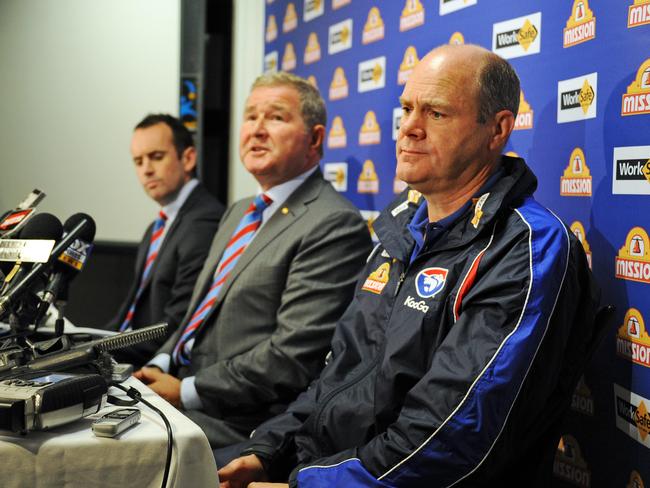
“The first time I was coaching the boys were young, but as time goes on, you can see it affect them because everybody, their friends, are aware of the situation. It didn’t affect me at the Swans that way, but maybe at the Bulldogs towards the end maybe.
“I would think in Adelaide and in Perth the pressure (on families) would be a lot more focused than it would be in Melbourne. And Melbourne is brutal enough as it is, but when you hear, for example, what happened to Robert Shaw at Adelaide, and especially if you’re an outsider, I think it carries it to another level.”
All his three sackings had the capacity to prick his self esteem, but Eade says you “put it in its context, put it in its box” and remain positive. That’s the message for Simpson.
“With Simmo, I know it’s been a tough few years results-wise, but his record before that was really good,” he said. “So, I would think once the dust settles, his name, just like Nathan Buckley is, will get mentioned for quite a few jobs.
“I think Adam once he can clear his head and get all this bad water out of his system, he will reflect and know that he can coach.
“I think self esteem, if that’s the right phrase, might take a hit, but you’re not the worst-off person in the world. It’s footy, OK, we bounce back. Adam is a strong, resilient person. Most coaches are pretty pragmatic. It’s a bit of a kick in the guts, but you work it through and Adam will come out the other.”
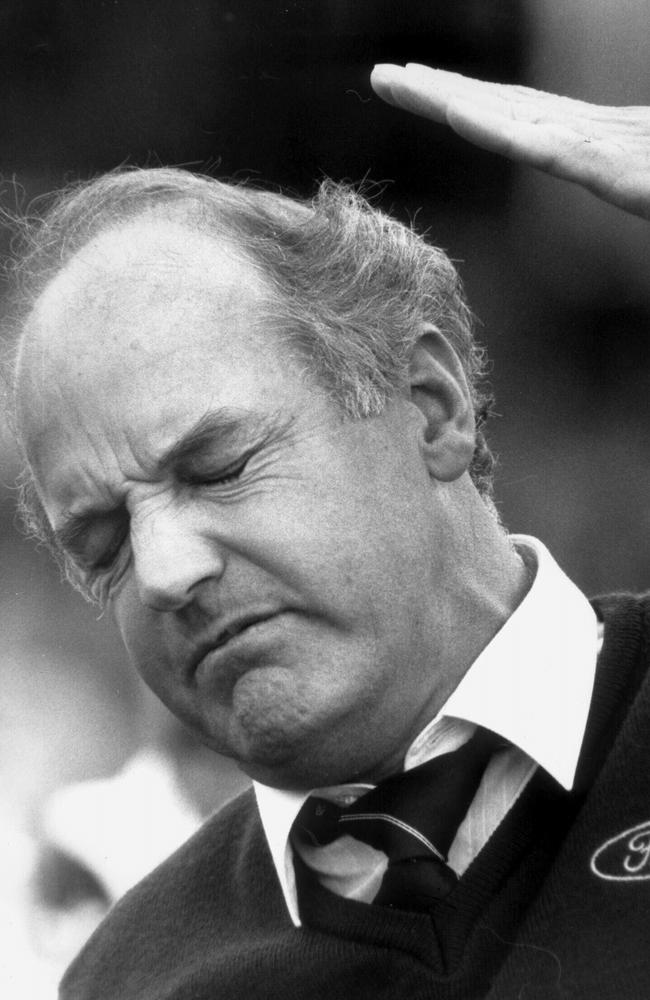
STABLE CATS
Colin Carter was Geelong president from 2010-20 and is one of those rare presidents who didn’t sack a coach. Proudly, he says the last time the Cats sacked their coach was John Devine in 1988.
In the same period, 1988 to now, St Kilda has sacked nine coaches.
Carter says he would look at other clubs in turmoil and be thankful and appreciative of Chris Scott.
“I used to get letters from members all the time saying it was time to sack the coach because we weren’t actually making Grand Finals and winning them,” he said.
“I’m a huge believer in data. I could see what he was doing was extraordinary. In fact, what’s happened to Richmond, and Hawthorn and Brisbane after their repeats just reinforces how extraordinary I thought Scotty was because he was never out of contention and completely rebuilt the list, and nobody has done that.”
When Carter was named president, coach Mark Thompson had chosen to leave the club – with the club’s blessing – and Gary Ablett Jnr had quit for the Gold Coast. “The number of people who said to me ‘you’ve got the poison chalice’ was pretty amazing,” he said.
Scott has won two flags and has the highest winning percentage of any coach.
“So, we were dealing with someone who was shooting the lights out, so why would we not try to protect that?” Carter said.
No, Scott is not getting sacked any time soon, if ever. The same can’t be said of many other coaches, past or present.




